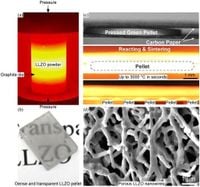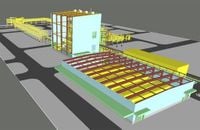In a significant move towards advancing battery technology, Japanese petroleum company Idemitsu Kosan has announced plans to construct a large-scale production facility for lithium sulfide, a crucial intermediate raw material needed for the mass production of solid-state batteries. This endeavor is set to expand the company’s production capacity to the equivalent of 3 GWh of storage batteries annually, bolstered by a partnership with Belgian materials firm Umicore to co-develop catholyte materials.
The facility, with an estimated investment of ¥21.3 billion, will be located in Chiba, Japan, and is expected to be completed by June 2027. The move comes as part of Idemitsu’s broader ambition to commercialize solid-state batteries between 2027 and 2028. The Japanese Ministry of Economy, Trade and Industry has approved the initiative as a “plan for ensuring supply of storage batteries,” allowing Idemitsu to qualify for a grant of up to ¥7.1 billion.
Since establishing mass production technology for lithium sulfide back in 1994, Idemitsu has made considerable strides, launching two smaller verification facilities. The company initiated the basic design for a large pilot facility in October 2024, underscoring its commitment to producing lithium sulfide at a scale necessary for future battery development. "The decision to construct an Li2S large-scale facility on this occasion was made because mass production of lithium sulfide, an intermediate raw material, is essential for the mass production of solid electrolytes in the future," an Idemitsu spokesperson expressed.
However, the broader landscape of solid-state lithium batteries presents a mixed picture. These batteries have long been touted as a potential game-changer in energy storage due to their promise of enhanced safety, longer ranges, and faster charging times. They are expected to be commercialized between 2026 and 2028. Yet, recent research has raised concerns about their actual performance compared to traditional lithium-ion batteries.
A recent study evaluated the performance of an all-solid-state lithium metal battery (ASSLMB) utilizing lithium lanthanum zirconium oxide (LLZO), a leading candidate for solid electrolytes. Findings reveal that such a battery would only achieve a gravimetric energy density of 272 Wh/kg, insignificantly more than the 250-270 Wh/kg provided by existing lithium-ion batteries. This limited increase casts doubt on the viability of solid-state batteries as a superior alternative.
Lead author of the study, Eric Jianfeng Cheng from Tohoku University, noted, "All-solid-state lithium metal batteries have been viewed as the future of energy storage, but our study shows that LLZO-based designs may not provide the expected leap in energy density. Even under ideal conditions, the gains are limited, and the cost and manufacturing challenges are significant." This concern has prompted researchers to explore hybrid approaches that blend LLZO with other materials to enhance performance.
Despite the potential of LLZO, challenges such as brittleness, difficulties in creating defect-free thin sheets, and the threat posed by lithium dendrites continue to hinder the path to large-scale implementation. The study further emphasizes that although LLZO's volumetric energy density may reach approximately 823 Wh/L, the material's weight and cost could impose serious barriers to commercialization.
Looking ahead, the pursuit of solid-state batteries necessitates thoughtful engineering solutions that strike a balance between performance, manufacturability, and cost. For instance, hybrid strategies that utilize LLZO in conjunction with polymer or gel-based electrolytes show promise, maintaining high ionic conductivity while also improving flexibility.
This landscape underscores the duality in battery technology advancements: while companies like Idemitsu Kosan move forward with ambitious plans to meet future energy storage demands, ongoing research serves as a reminder of the hurdles that must be overcome. Innovations in battery technology remain vital as the global shift toward sustainable energy storage accelerates.
As the landscape evolves, stakeholders from various sectors will need to keep an acute eye on developments in battery technology. The successes and setbacks will not only shape the future of energy storage but also influence the broader conversation around electric vehicles and the push for a cleaner energy future. For now, the world watches closely as companies like Idemitsu Kosan stake their claim at the forefront of this crucial industry.






